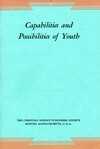

Are you sure?
This bookmark will be removed from all folders and any saved notes will be permanently removed.
Greater than Circumstances
[Written Especially for Young People]
One of the enslaving beliefs of the human mind is the temptation to feel that circumstances are greater than we are; that they can master us and affect us injuriously, and that, therefore, we can legitimately place the blame for our failures on situations outside ourselves. This insidious tendency of mortal mind seems to begin very early in our experience. In the midst of a quarrel in their play small children, when corrected, sometimes point to one of their number and exclaim, "Well, he started it!" This blaming somebody or something, unless detected and cast out, seems to grow; and young people who are in school, or are taking their first steps in business, must meet and master the same argument, if they would learn how to defend themselves and live successful lives.
If we were to believe what we sometimes hear voiced: the student in school would be happy if he had a different roommate; would be successful in his studies if it were not for one of his teachers; would be a great athlete if his teammates gave him a chance! Later on, we may think we should rise rapidly in the business world if it were not for some error manifested by our employer; we should be more successful socially if we lived in a different neighborhood; we should be better Christian Scientists if our work permitted us more time for study! So it goes, with a different argument to fit every situation, but with the telltale resemblance in all the arguments—the attempt of mortal mind to justify itself and make the individual seek to place outside of his own thinking the entire blame for his failures, inadequacies, and wrongdoings.
Christ Jesus, our great Way-shower in human living, once said, "A man's foes shall be they of his own household." Applied to the tendency which we have been discussing, this would seem to mean that our foes, our enemies, the things which seem to oppose our progress, do not come from without, but from within our own thought. While this may not seem to be a comfortable thing to contemplate, since it places squarely upon our own shoulders the responsibility for our defeat, it at the same time offers us a satisfying clew to the solution of our problems. In our daily contacts we cannot expect to bend other people and other circumstances to our point of view, but we can never be prevented from rectifying our own thinking about a given situation. Our happiness or unhappiness is, therefore, dependent only upon our own alertness in guarding the doors of thought.
Enjoy 1 free Sentinel article or audio program each month, including content from 1898 to today.
JSH Collections
This article is included in:
1945 - PAMPHLET
Capabilities and possibilities of youth
JSH-Online has hundreds of pamphlets, anthologies, and special editions for you to discover.

May 11, 1935 issue
View Issue-
The Lord's Prayer
BLANCHE HERSEY HOGUE
-
Love Alone Solves All Human Problems
CHARLES F. HACKETT
-
Learning to Use the Concordances
EMMA H. SAYLES
-
Constructive Argument
WINSTON G. MITCHELL
-
Giving
EUGENE HUDGINS
-
"And there was a great calm"
D. MURIEL SAVARY
-
Greater than Circumstances
E. OLIVE DAVIS
-
A Child's Prayer
MARGARET MILLER COPELAND
-
In your issue of August 2, an article mentioned a certain...
Albert E. Lombard, Committee on Publication for Southern California,
-
Permit me to add something to what you said of Christian Science...
Meinrad Schnewlin, Committee on Publication for German-speaking Switzerland,
-
In reply to your correspondent's letter of May 28, I...
Albert J. Windle, Committee on Publication for Nottinghamshire, England,
-
It is evident from the subsequent letters appearing in...
C. Shelton Agar, Committee on Publication for Natal, South Africa,
-
Immanuel
IVA B. LINEBARGER
-
Rightful Spiritual Nutriment
Duncan Sinclair
-
Formidableness
Violet Ker Seymer
-
The Lectures
with contributions from Cora M. Gowell
-
When Christian Science was presented to me by a friend...
Elvena Gates with contributions from Alva Francis Gates
-
For several years I searched many books, including those...
Ethel Phillips
-
Six years ago, when I was given up by doctors, my family...
Addie M. Bates
-
In thankfulness for the great help which I have received...
Wilhelmine Kröger
-
I desire to express my gratitude for the many blessings...
Clyde S. Bugbee
-
Paul said, "Be ye transformed by the renewing of your...
Marie Osterland
-
Under the marginal heading "Recognition of benefits,"...
Lewis A. Wilson
-
It is about twelve years since Christian Science was first...
Elsie Thomas with contributions from Francis G. Thomas
-
These, My Brethren
CHARLES EDWIN ANDERSON
-
Signs of the Times
with contributions from T. F. Opic, Oliver C. Quick, Harold E. Carlson


